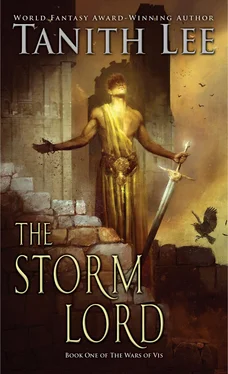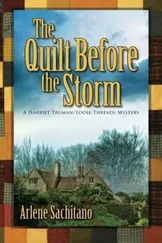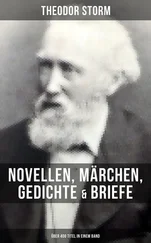Riyul was a man of Marsak, a soldier fourteen years since, a mercenary by trade to any land that would buy him, until the profits of his homeland army tempted him. The command of the Plains’s garrison had come to him unexpectedly, with Amrek’s illness. It made him both imperious and uneasy. He subdued the city by terror, out of deference to Amrek’s hate, but also because it came easy to him.
He questioned the Lowlander for an hour, between the strokes of the whipman, as first snow drifted by the windows. Meetings of more than two men at a time were prohibited. The restriction had been a matter of course, until now either observed or unnecessary. The Lowlander bled, but said nothing. Riyul had him slung at last into the cellars of the palace which made such an excellent jail, and left him there to rot. There were no further gatherings, at least none the Dortharians spotted. There seemed no need to be troubled. The Plains people were a passive, servile race—everyone knew it—with livers pale as their skin.
There was a Lannic juggler in the hall that night, a clever devil who had struck up an acquaintance with a soldier at the garrison gate and wheedled his way in. Riyul threw him a silver piece.
It seemed he had legitimate business of some kind with the Ommos, Dakan, but the interesting thing about him was the talk he started of Lowland whores. Such a creature had never been seen, either in the city or out of it, yet the Lan claimed he had laid skinny blonde bitches galore, who, for a fee or a false promise of safety, would teach all manner of interesting bed tricks.
Riyul’s curiosity was whetted; his loins began to disturb him at the thought. Had there not been old stories of temple prostitutes?
Riyul’s name day fell in the gray time of the thaw. He had planned to have himself honored then by a makeshift feast in the palace hall, in the manner of a conqueror. He was playing at greatness, a dangerous silly game, in Amrek’s absence. Drunk, and lusting for white flesh suddenly in his smoky chamber, he sent the juggler word that if he valued garrison pickings, he had better make good his boast and provide it with some Lowland whores on the evening of the feast.
Yannul slept very deeply in the stagnant barracks that night. A cheerful madness had come on him with the continuance of the crazy acts he must commit. Vague thoughts of horror, of blood to come, he set aside. He had no choice. He had known as much when he rode across the alien summer landscape behind Raldnor, and sensed the stirrings of chaos underground.
His head heavy with the garrison wine, his last thoughts had also been of women, though in a temperate vein. Resha, his Alisaarian girl, for one, who had gone with a Vathcrian noble to live an unaccustomed life of order and fine clothes. She, who had initially feared racial enmity, had surprised Yannul by taking complacent refuge in camouflage. The Vathcrian had begun to pay her court in the last month at Vardath, when the nights were red from forge smoke and the roads rumbled with the passage of the great trees felled for ships. She must have learned early to survive and ride her chances aboard the Zakorian pirate. Now, a schooled opportunist, she accepted her suitor despite all obstacles, and the matter of his age, for he was well into his middle years—it made him a safer proposition, clearly. If it was her novelty that attracted him, however, the noble was to be sorely tried, for, once their union seemed likely, Resha had turned like a chameleon. She bleached her hair and began to use a face paint much like Dortharian Val Mala’s famous white unguent. Yannul rendered Resha all applause, and hoped her shaky house would stand. There had been no romance between them but a deal of liking. He only trusted her stout lover could keep pace with her through the dark.
Whatever else, he guessed she might be happier than the pale-haired girl, Jarred’s sister, they had wed to Raldnor at the altar of Ashkar Anackire. She had already the look of a woman who loved deeply and forever, but went unnoticed in return. Raldnor had been gentle with her, no doubt, but it would be an impersonal, automatic gentleness. And once the solitary month was up, he had left her and would probably never go back. A great pity, for she had been worth a second look, had Sulvian of Vathcri.
Asleep, Yannul dreamed of the farm in Lan. Snow thick on the hills, icicles stabbing from the roof. His mother happily heavy with child as she seemed perpetually to be, his sisters singing and squabbling at the loom, or nursing birds which had fallen, half-dead from the cold, beside the door. In the second thaw, three thin large-eyed girls holding out handfuls of wings. White birds soaring up from brown hands without a word of thanks; white birds turning black against the blue sky.
On the narrow pallet, Yannul dreamed of home. The ghosts of the palace left him alone.
Over the city the snow moon burned like a lamp of blazing ice. Sentries passed on the wall of the garrison, shivering and cursing.
“Do you hear that sound?” one asked the other.
“What sound? I can only hear my guts freezing.”
Yet he sensed also the electric movement of the air, less sound than vibration, a deaf thrumming under their feet, the twanging of a silent harp.
Somewhere, a wolf howled, sharp as a spike.
The sentry grinned.
“Do you remember that old man with the pet wolf—the black bitch Ganlik got with his spear? Lucky devil, Ganlik, with that pelt to wrap up in of a night.”
“I’ve heard Ganlik’s sick,” the other said.
They separated and moved on. A cloud choked out the moon.
And in Sar, Amrek dreamed of Astaris on the back of a white monster. Her hair bled over her shoulders, and her face was a golden skull.
Snow flamed on the wind. The wind was on fire with snow.
When the snow stopped, the Plains lay in unbroken whiteness under an exhausted purple sky.
The detachment of soldiers wound in a slow black rope across the blank whiteness of the land. Their business—the urgent provisioning of the garrison—was one they cursed in their various fashions. The makeshift pens, originally packed full of Lowland cattle stolen by Dortharians in warmer months, had grown progressively roomier as the occupation dragged on. Now the snow had come, while Amrek still took his ease in Sar, and the second Siege Snow would not be far behind it. There was talk they might even have to spend the winter here in this stinking verminous hole.
The detachment’s captain snarled out his orders and chafed his hands. Frozen to his very bones, he was thinking of a particular woman he had left behind in Dorthar, a bitch he was sure would find other amusements in his absence, and now had all the cold days to catch some filthy disease with which to present him on his return. In addition they had passed one farm holding and a village, both of which had been empty.
The second village showed itself to them two hours after noon, when the sky was already darkening drearily.
The gate in the stockade was wide. They rode through, and up the broad street, the men fanning out, stabbing open doors, peering into the musky gloom of stables and barns. Neither human nor beast remained. Shutters flapped and slapped at windows.
The hooves of the animals pushed the track into mud, and the swinging braziers spat pink phlegm.
A shadow ran suddenly out between the houses, its eyes a leap of flame. With hoarse nervous shouts men leveled spears at it.
“Wolf!”
But the thing vanished like a spirit.
“Ride on,” the captain bawled.
They overtook no one and found no footsteps in the snow.
The next village, the third, was nearer—only a mile or so.
Some plates lay broken in the road, partly covered by snow. A heavy silence welled up to meet them. They searched and found nothing. Once there came the whirr of a wheel on a loom, but it was the wind that turned it.
Читать дальше












